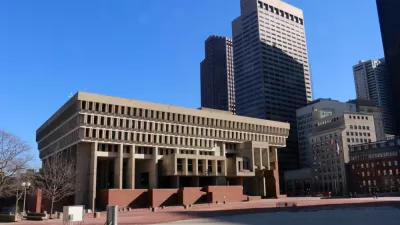Leon Neyfakh of The Boston Globe examines the unexpectedly cohesive political roots of the controversial civic symbol.
Neyfakh reveals that public Christmas trees were first introduced as an American tradition due to a "secretive coalition of Progressive-era social reformers. These civic-minded idealists tried to recast Christmas as an essentially public holiday that could unite people of different ethnicities and social classes behind a single shared tradition."
The rise in new industries and advances and technology brought millions of European immigrants to America in the early 1900s. As cities became more diverse and overpopulated, "social reformers began to fear that the American people were becoming atomized and rootless. They worried that new immigrants would never start feeling at home here, and instead remain isolated in their ethnic enclaves. They worried the poor would be ignored and trampled upon. Looking out at a nation in crisis, the Progressives saw Christmas trees as an opportunity to intervene."
In modern times, it is easy for people to view religious holidays and practices such as the civic Christmas tree as merely exclusionary, and not as as "a catalyst of civic unity, an inclusive gesture that in its time had less to do with expressing a faith than in fostering an idealized vision of American society."
FULL STORY: The secret origins of the civic Christmas tree

Planetizen Federal Action Tracker
A weekly monitor of how Trump’s orders and actions are impacting planners and planning in America.

Chicago’s Ghost Rails
Just beneath the surface of the modern city lie the remnants of its expansive early 20th-century streetcar system.

San Antonio and Austin are Fusing Into one Massive Megaregion
The region spanning the two central Texas cities is growing fast, posing challenges for local infrastructure and water supplies.

Since Zion's Shuttles Went Electric “The Smog is Gone”
Visitors to Zion National Park can enjoy the canyon via the nation’s first fully electric park shuttle system.

Trump Distributing DOT Safety Funds at 1/10 Rate of Biden
Funds for Safe Streets and other transportation safety and equity programs are being held up by administrative reviews and conflicts with the Trump administration’s priorities.

German Cities Subsidize Taxis for Women Amid Wave of Violence
Free or low-cost taxi rides can help women navigate cities more safely, but critics say the programs don't address the root causes of violence against women.
Urban Design for Planners 1: Software Tools
This six-course series explores essential urban design concepts using open source software and equips planners with the tools they need to participate fully in the urban design process.
Planning for Universal Design
Learn the tools for implementing Universal Design in planning regulations.
planning NEXT
Appalachian Highlands Housing Partners
Mpact (founded as Rail~Volution)
City of Camden Redevelopment Agency
City of Astoria
City of Portland
City of Laramie



























